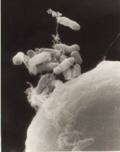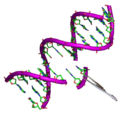Agrobacterium is a genus of Gram-negative bacteria established by H. J. Conn that uses horizontal gene transfer to cause tumors in plants. Agrobacterium...
25 KB (2,603 words) - 09:37, 11 November 2024
Agrobacterium tumefaciens (also known as Rhizobium radiobacter) is the causal agent of crown gall disease (the formation of tumours) in over 140 species...
40 KB (4,467 words) - 17:50, 6 November 2024
Agrobacterium radiobacter is the type species of the genus Agrobacterium. It was formerly incorrectly synonymized with Agrobacterium tumefaciens. Unlike...
3 KB (307 words) - 02:19, 21 December 2024
Rhizobium rhizogenes (redirect from Agrobacterium rhizogenes)
Rhizobium rhizogenes (formerly Agrobacterium rhizogenes) is a Gram-negative soil bacterium that produces hairy root disease in dicotyledonous plants....
7 KB (756 words) - 15:51, 5 July 2024
Agrobacterium albertimagni is a species of arsenite-oxidizing bacterium. Salmassi, Tina M.; Venkateswaren, Kasthuri; Satomi, Masataka; Newman, Dianne...
1 KB (98 words) - 07:24, 24 February 2021
Gene delivery (section Agrobacterium)
plants the DNA is often inserted using Agrobacterium-mediated recombination, taking advantage of the Agrobacteriums T-DNA sequence that allows natural insertion...
25 KB (2,878 words) - 19:30, 14 August 2024
tumor-inducing (Ti) plasmid of some species of bacteria such as Agrobacterium tumefaciens and Agrobacterium rhizogenes (actually an Ri plasmid). The T-DNA is transferred...
14 KB (1,865 words) - 06:03, 24 September 2024
tumour inducing (Ti) plasmid is a plasmid found in pathogenic species of Agrobacterium, including A. tumefaciens, A. rhizogenes, A. rubi and A. vitis. Evolutionarily...
46 KB (5,743 words) - 23:15, 23 September 2024
Pseudomonas savastanoi (redirect from Agrobacterium savastanoi)
bacteria, in a similar manner to the well-studied crown gall pathogen, Agrobacterium tumefaciens. One of the first scientists to carry out scientific and...
8 KB (575 words) - 18:25, 21 December 2024
Allorhizobium vitis (redirect from Agrobacterium vitis)
shares many genetic and morphological characteristics with several Agrobacterium species, including A. tumefaciens. The two species have overlapping...
16 KB (1,701 words) - 04:12, 8 March 2022
of the Rhodobacteraceae. This genus was formerly known as the marine Agrobacterium before they were reclassified in 1998. It bears in fact the name of...
9 KB (738 words) - 06:36, 19 May 2024
bacteria in genus Agrobacterium. The virA gene on the Ti plasmid of Agrobacterium tumefaciens and the Ri plasmid of Agrobacterium rhizogenes is used...
8 KB (668 words) - 15:27, 19 June 2023
aurantius Acinetobacter baumannii Actinomyces israelii Agrobacterium radiobacter Agrobacterium tumefaciens Anaplasma Anaplasma phagocytophilum Azorhizobium...
7 KB (451 words) - 15:45, 26 December 2024
genera are the human pathogens Bartonella and Brucella, as well as Agrobacterium, an important tool in genetic engineering. Aestuariivirgaceae Li et...
15 KB (1,119 words) - 17:10, 3 December 2024
mouse embryo in 1982. In 1897 a bacterium that caused plant tumors, Agrobacterium tumefaciens, was discovered and in the early 1970s the tumor-inducing...
54 KB (6,762 words) - 07:39, 2 November 2024
infection by Agrobacterium tumefaciens, which causes gall diseases in many plants, by dipping cuttings in suspensions of Agrobacterium radiobacter before...
13 KB (1,291 words) - 19:47, 20 September 2024
nutrition and collectively make up the rhizobia. Other bacteria such as Agrobacterium tumefaciens and Rhizobium rhizogenes severely alter the development...
6 KB (403 words) - 22:31, 23 May 2023
Physcomitrella patens are commonly used to study plant cell biology. Agrobacterium tumefaciens, a soil rhizosphere bacterium, can attach to plant cells...
137 KB (14,805 words) - 01:10, 3 January 2025
bacilli. Erwinia uses cell wall–degrading enzymes to cause soft rot. Agrobacterium changes the level of auxins to cause tumours with phytohormones. Significant...
27 KB (2,415 words) - 17:24, 6 November 2024
transform. While plants can be transformed with a construct introduced into Agrobacterium tumefaciens via agroinfiltration or floral dip, most animal cells would...
15 KB (1,850 words) - 07:46, 28 October 2024
Plant genetics (section Agrobacterium method)
the tissue by Agrobacterium. Because of this, microprojectile bombardment often increases the efficiency of infection with Agrobacterium. The marker is...
38 KB (4,361 words) - 16:12, 26 December 2024
order to produce a desired protein. In the method, a suspension of Agrobacterium tumefaciens is introduced into a plant leaf by direct injection or by...
11 KB (1,372 words) - 07:39, 28 October 2024
production have been identified in Agrobacterium sp. ATCC31749, which produces curdlan in extraordinary amounts, and Agrobacterium tumefaciens. A putative operon...
5 KB (552 words) - 08:41, 4 October 2023
inter-kingdom conjugation. For example, the tumor-inducing (Ti) plasmid of Agrobacterium and the root-tumor inducing (Ri) plasmid of A. rhizogenes contain genes...
22 KB (2,419 words) - 03:04, 2 January 2025
et al. (2014). "A rapid, highly efficient and economical method of Agrobacterium-mediated in planta transient transformation in living onion epidermis"...
66 KB (7,006 words) - 14:00, 23 November 2024
naturally occurring Ti plasmid found in bacterial species of the genus Agrobacterium, such as A. tumefaciens. The binary vector is a shuttle vector, so-called...
10 KB (1,016 words) - 13:46, 2 May 2024
presence of a fragment of Agrobacterium Ti plasmid DNA in the nuclear DNA of crown gall tissue. Her research on Agrobacterium also showed that the genes...
9 KB (712 words) - 15:31, 24 December 2024
tumors or hairy root tumors produced by pathogenic bacteria of the genus Agrobacterium and Rhizobium. Opine biosynthesis is catalyzed by specific enzymes encoded...
10 KB (1,381 words) - 12:16, 7 April 2024
genome of cultivated sweet potatoes contains sequences of DNA from Agrobacterium (sensu lato; specifically, one related to Rhizobium rhizogenes), with...
102 KB (10,137 words) - 23:48, 21 December 2024
treatment plants efficiently degrade EDTA. Specific strains include Agrobacterium radiobacter ATCC 55002 and the sub-branches of Pseudomonadota like BNC1...
42 KB (4,376 words) - 00:59, 24 December 2024

















